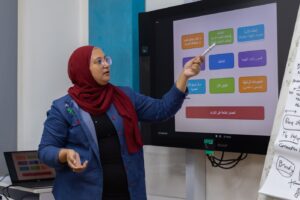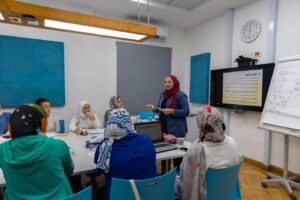Dr. Reham Mahmoud Zaky El Sayed is an alumna of the International Visitor Leadership Program and a 2023 recipient of the IVLP Impact Awards for her project Enhancing Management of Egyptian Cultural Heritage Sites: A Capacity Building Program. Meridian International Center, in partnership with the U.S. Department of State Bureau of Educational and Cultural Affairs, implements the IVLP Impact Awards Initiative. IVLP Impact Awardees from across the world administer community impact projects that build on their experiences and promote innovative solutions to shared challenges. The IVLP Impact Awards Initiative aims to engage alumni, strengthen global networks, and support lasting community impact.
 U.S. Impressions
U.S. Impressions
I have been involved in cultural heritage preservation since 2010, when I worked for Alexandrina Bibliotheca on an ambitious project digitalizing the national Egyptian Archives service into a digital database. Since 2012, I have worked for the Ministry of Tourism and Antiquities and through this work, I was nominated to participate in the IVLP in 2018 and again virtually in 2022. During these exchanges, I was lucky to be able to visit several institutions and museums where we got “behind the scenes” tours of labs, storerooms and even libraries. This allowed us to see how these institutions manage and preserve their own collections, whether in storage or on display. Virtually, I got to tour many exciting places, including world heritage sites where I found my passion to work. In both programs, I was accompanied by several Egyptian colleagues, many of whom I had worked or trained with.
IVLP provided the opportunity to visit two important places: the Smithsonian Institution and the Presidential Residents in Charlottesville, Virginia. During our short visit, I was impressed by how the Smithsonian uses advanced technology in cultural heritage documentation, such as augmented reality (AR) and virtual reality (VR) technologies. The Presidential Residence in Charlottesville was one of the most interesting examples of good practices for site and visitor management. I was impressed by the interpretative materials, the storytelling (including the signage) that accompanied the displays. Multimedia video and audio highlighted remarkable phases of American history and brought sensitivity and clarity to important topics.
There is a need for Egyptian archaeologists and scholars to be trained on cultural heritage management
It is vital for ministry inspectors, archaeologists, and heritage specialists to be familiar with new methods and concepts, rather than each profession remaining siloed. After being lucky enough to participate in IVLP, I started to think ‘why not transfer what I learned to other colleagues?’
I had already been designing an inclusive curriculum with subjects, so when I found the call for applications for the IVLP Impact Award, it was a perfect fit. This grant is the ideal opportunity for me to host a training project for my 15 participants. When the open call for my training was launched, we got more than 360 applications!
My IVLP Impact Award project is a training program called “Benaa” meaning “building” in Arabic, on the fundamentals of cultural heritage management with a focus on Egyptian archaeological sites. The training has three main approaches: 1. Interactive classroom lectures, 2. individual and group assignments, including site visits and 3. guest lectures by several experts from Egypt, Spain, Greece, UK, and Rwanda, who present diverse topics and case studies. These guest lectures also included three other IVLP alumni: Essam Nagy the manager of EES Cairo Office, Azmy Salama (PhD candidate and tour guide), and Reham Hussien (Evaluation and Mentoring specialist).
 Involving a diverse group of people from different backgrounds is a vital process
Involving a diverse group of people from different backgrounds is a vital process
I tried to combine different groups of participants: inspectors for the Ministry of Tourism and Antiquities, including Historic Cairo and Heliopolis archaeological site, staff from local universities, museums and NGOs, and a mix of undergraduate, masters and post-graduate students, who impress me with their ability to co-work and interact with professionals. Involving students gives them an opportunity to interact with the inspectors who work in archaeological sites and museums. In addition to helping them with their early careers, they bring interesting perspectives to debates, and the project has allowed these groups to compare ideas.
To be beneficial and productive, an effective cultural heritage management process should engage many parties: managers, right-holders, and stakeholders. In the training, we try to integrate all participants through group assignments, joint brainstorming, and sharing new ideas. In the long term, this methodology will be a guiding concept in their career and post-graduate studies. I hope that this group will become at the core a task force involved in cultural heritage preservation throughout Egypt. I am already thinking about the next step, continuing this training outside of Cairo in the future, or expanding into more complex topics.
Dr. Reham Mahmoud Zaky El Sayed was a participant on the IVLP Project Cultural Heritage Preservation in Virtual Reality, organized by the U.S. Department of State. Learn more about her IVLP Impact Award project, Enhancing Management of Egyptian Cultural Heritage Sites: A Capacity Building Program on our website.
















